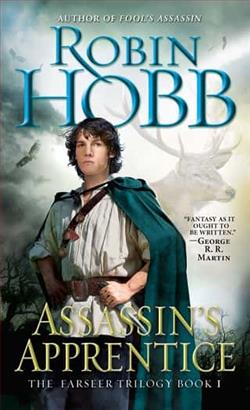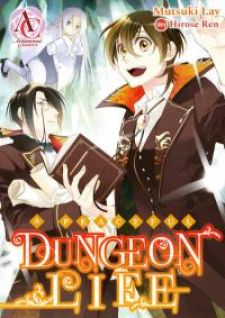Summary

Assassin's Apprentice
by Robin Hobb
With unforgettable characters, a sweeping backdrop, and passionate storytelling, this is a fantasy debut to rival that of Robert Jordan. Filled with adventure and bloodshed, pageantry and piracy, mystery and menace, Assassin's Apprentice is the story of a royal house and the young man who is destined to chart its course through tempests of change. Young Fitz is the bastard son of the noble Prince Chivalry, raised in the shadow of the royal household by his father's gruff stableman. An outcast whose existence has forced his father to abdicate his claim on the throne, Fitz is ignored by all royalty except the devious King Shrewd, who has him secretly tutored in the arts of the assassin. For in the young man's blood is a heritage of magic, the talent called the Skill, as well as another, even more mysterious ability.
As barbarous raiders ravage the coasts and leave behind the zombie-like husks of the townspeople to prowl the countryside, Fitz is growing toward manhood. Soon he will face his first dangerous, soul-shattering mission, a mission that poses as much a threat to himself as it does for his target---for Fitz is a threat to the throne...but he may also be the key to the survival of the kingdom.
.
Read
Assassin's Apprentice on http://kissnovel.net
Martial Peak Reviews
Robin Hobb's Assassin's Apprentice is a masterful entry into the realm of epic fantasy, a genre often dominated by sprawling narratives and intricate world-building. Hobb, however, distinguishes herself with a debut that not only rivals but, in many ways, surpasses the works of her contemporaries. This novel is the first in the Farseer Trilogy and sets the stage for a deeply immersive journey into a world of intrigue, magic, and personal growth.
At the heart of the story is FitzChivalry Farseer, known simply as Fitz, a character whose complexity and depth are the driving forces of the narrative. As the illegitimate son of Prince Chivalry, Fitz is thrust into a life of uncertainty and isolation. His existence is a catalyst for change within the royal family, leading to his father's abdication and his own subsequent upbringing under the care of Burrich, the stablemaster. This dynamic sets the tone for Fitz's life—a life marked by the duality of belonging and alienation.
Hobb's portrayal of Fitz is nothing short of remarkable. She crafts him as a character who is both relatable and extraordinary. Fitz's journey from a neglected child to a young man trained in the deadly arts of assassination is fraught with emotional turmoil and moral ambiguity. The author delves deep into his psyche, exploring themes of identity, loyalty, and the burdens of destiny. Fitz's internal struggles are mirrored by the external challenges he faces, creating a rich tapestry of conflict that keeps readers engaged from start to finish.
One of the standout elements of Assassin's Apprentice is Hobb's ability to weave magic into the fabric of her world in a way that feels both organic and integral. The Skill, a form of telepathic communication and manipulation, is a hereditary talent that Fitz possesses. This magical ability is not just a tool for plot advancement but a crucial aspect of Fitz's identity and his connection to the royal family. Additionally, Fitz harbors another mysterious power known as the Wit, which allows him to bond with animals. This duality of magic serves as a metaphor for Fitz's dual heritage and the constant tension between his human and animalistic instincts.
The backdrop against which Fitz's story unfolds is equally compelling. The Six Duchies, a kingdom besieged by barbarous raiders known as the Red-Ship Raiders, provides a setting rife with political intrigue and danger. Hobb's world-building is meticulous, with each location and character contributing to the overall atmosphere of tension and uncertainty. The threat of the raiders, who leave behind soulless husks of their victims, adds an element of horror and urgency to the narrative, underscoring the stakes of Fitz's mission and the broader conflict at play.
Hobb's storytelling is characterized by its emotional depth and nuanced character development. Unlike many fantasy novels that prioritize action and spectacle, Assassin's Apprentice is a character-driven tale that prioritizes the inner lives of its protagonists. The relationships that Fitz forms, particularly with Burrich, King Shrewd, and his enigmatic mentor Chade, are central to his growth and the unfolding of the plot. These interactions are imbued with a sense of realism and complexity that elevates the narrative beyond mere fantasy tropes.
In comparison to other works in the genre, such as those by Robert Jordan or George R.R. Martin, Hobb's approach is refreshingly intimate. While Jordan's Wheel of Time series and Martin's A Song of Ice and Fire are known for their expansive casts and intricate political machinations, Hobb focuses on the personal journey of a single character. This focus allows for a more detailed exploration of Fitz's character and the themes of identity, duty, and sacrifice that permeate the novel.
The impact of Assassin's Apprentice extends beyond its immediate narrative. It is a book that lingers in the mind long after the final page is turned, prompting readers to reflect on the nature of power, the cost of loyalty, and the search for belonging. Hobb's prose is both lyrical and precise, capturing the beauty and brutality of Fitz's world with equal skill. Her ability to evoke emotion and create tension is unparalleled, making this novel a standout in the fantasy genre.
In conclusion, Robin Hobb's Assassin's Apprentice is a triumph of storytelling that combines rich character development with a vividly imagined world. It is a novel that challenges and rewards its readers, offering a deeply personal and profoundly moving exploration of a young man's journey to find his place in a world that both rejects and needs him. For fans of epic fantasy and character-driven narratives, this book is an essential read that promises to leave a lasting impression.
























Reviews 0
Post a Reviews: